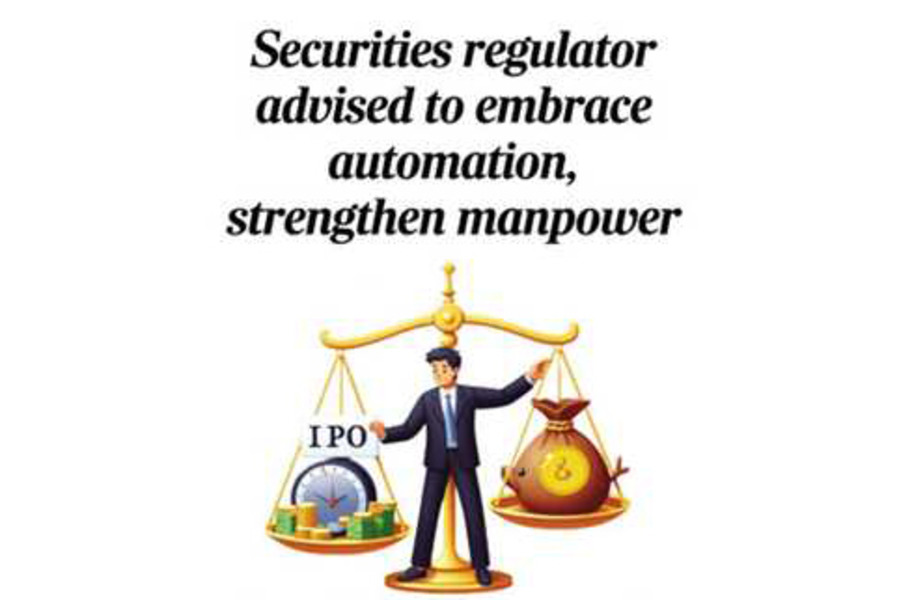
Published :
Updated :

The approval of an IPO (initial public offering) proposal takes longer in Bangladesh than in peer countries in the absence of any clear guidelines to comply with for public offerings, say merchant bankers.
They say the estimated time to receive approval of a proposal is around 18-24 months in Bangladesh whereas an issuer company in India gets regulatory approval within six months.
So, bank loans have become a quicker and preferred solution to the need for financing here.
According to the 2015 public issue rules, the securities regulator has to approve or reject a proposal within 60 days upon receiving a complete application with all necessary documents.
"An application shouldn't be considered complete as long as there are papers missing," said BSEC executive director and spokesperson Mohammad Rezaul Karim.
Leading steel maker BSRM Ltd. submitted its IPO proposal with its financial statements for FY11 but received approval in December 2014. Because of the long delay the company had to revise its plan to utilize the IPO proceeds.
As per the rules, an issuer company has to submit its IPO proposal within 120 days from the cut-off date of its annual financial statements.
Apart from the Bangladesh Securities and Exchange Commission (BSEC), a company is required to submit its IPO proposal to both Dhaka and Chittagong bourses.
Then the market watchdog goes through the proposal and identifies shortcomings, if any. The bourses also give their opinions about the proposal.
The exchanges are required to submit observations on an IPO proposal to the BSEC within 30 days after the submission of the application.
Issue managers say the exchanges usually submit observations within the stipulated time. But there is no specific timeframe for the BSEC to complete its scrutiny.
Experts insist on formulating a regulatory framework to be followed by issuers and regulatory bodies regarding IPO proposals to create an enabling environment for business financing through listing.
Sumit Pudder, chief executive officer of merchant bank BD Capital, said a company would not be interested in going public unless it was aware of how much time it entails.
On the other hand, it hardly takes four months for a company to get bank loans.
Because of a long delay in completing the IPO process, the fund raised is not cost effective for many issuer companies.
The implementation of BMRE (balancing, modernisation, rehabilitation and expansion) is commonly included in the plans of IPO fund utilisation.
As the prices of raw materials fluctuate quite frequently, a company's estimated spending on BMRE is feared to go up when funding takes longer.
"That's why many companies prefer banks to IPOs [to get required funds for business]," Mr. Pudder said. Sometimes, the stock exchanges take a long time to submit their observations on an IPO application, he added.
The issuer companies also fail to give answers to queries made by the regulator within the expected time, said the BSEC spokesperson. "So, only the regulator is not responsible for a delay in the approval of an IPO proposal."
Possible solutions
The regulatory bodies in Bangladesh have a shortage of manpower unlike its peers. The workforces are also not well equipped.
A complete automation can ease the process of approving IPO proposals, said Mr Puddar.
The review process of documents is very smooth in India and other peer nations, he said, adding that the IPO process could be faster and easier if issuers were able to upload information online in response to queries of the BSEC and exchanges.
Additional documents are often sought by the regulator before approving an IPO proposal.
For example, in some cases the BSEC seeks bank statements of a company who has payments due to the issuer company. It becomes challenging to produce such kinds of documents unless the issuer company is aware of the requirement before the application submission.
BSEC spokesperson Mr. Karim said any stringent supervision would not have been needed had the auditors performed their tasks with sincerity and honesty.
The existing IPO valuation process is also blamed for the shrinking IPO flow over the last decade. Despite the "stringent scrutiny", Mr Karim said, the cut-off prices of IPO shares failed to persist in the secondary market.
"Automation will confirm if a document [that has been asked for] is uploaded online. But a desired goal would not be achieved unless all parties work sincerely," Mr Karim added.
Though the regulator emphasizes the need for extensive scrutiny of IPO proposals before companies are allowed to issue shares to the public, the market has witnessed more fraudulent companies than financially strong ones get listed over the last decade.
mufazzal.fe@gmail.com


 For all latest news, follow The Financial Express Google News channel.
For all latest news, follow The Financial Express Google News channel.